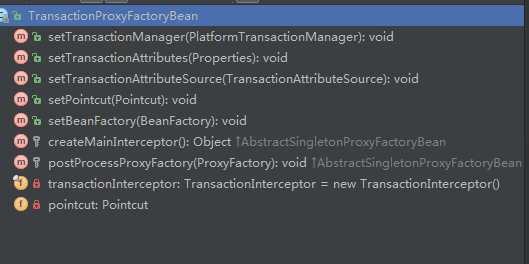Spring事务处理主要分以下三个主要的过程:
(1).读取配置的事务处理属性,并转化为Spring事务处理所需要的内部数据结构
(2).事务配置属性与线程绑定
(3).交由PlatformTransactionManager的具体实现类来实现,如DataSourceTransactionManager和HibernateTransactionManager
2。TransactionProxyFactoryBean
为Spring的事务处理的实现做准备工作,包括配置AOP的拦截器、通知器

发生事务时,首先通过getObject方法向Spring事务管理容器索取被被管理方法的事务属性,触发调用事务拦截器的拦截方法进行事务处理。
Spring的AOP代理通过invoke回调方法对切入点方法进行拦截处理
public class TransactionInterceptor extends TransactionAspectSupport implements MethodInterceptor, Serializable {
@Override public Object invoke(final MethodInvocation invocation) throws Throwable { // Work out the target class: may be {@code null}. // The TransactionAttributeSource should be passed the target class // as well as the method, which may be from an interface. Class<?> targetClass = (invocation.getThis() != null ? AopUtils.getTargetClass(invocation.getThis()) : null); // Adapt to TransactionAspectSupport's invokeWithinTransaction... return invokeWithinTransaction(invocation.getMethod(), targetClass, new InvocationCallback() { @Override public Object proceedWithInvocation() throws Throwable { return invocation.proceed(); } }); }
invokeWithinTransaction
protected Object invokeWithinTransaction(Method method, Class<?> targetClass, final InvocationCallback invocation) throws Throwable { // If the transaction attribute is null, the method is non-transactional. final TransactionAttribute txAttr = getTransactionAttributeSource().getTransactionAttribute(method, targetClass); final PlatformTransactionManager tm = determineTransactionManager(txAttr); final String joinpointIdentification = methodIdentification(method, targetClass); if (txAttr == null || !(tm instanceof CallbackPreferringPlatformTransactionManager)) { // Standard transaction demarcation with getTransaction and commit/rollback calls. TransactionInfo txInfo = createTransactionIfNecessary(tm, txAttr, joinpointIdentification); Object retVal = null; try { // This is an around advice: Invoke the next interceptor in the chain. // This will normally result in a target object being invoked. retVal = invocation.proceedWithInvocation(); } catch (Throwable ex) { // target invocation exception completeTransactionAfterThrowing(txInfo, ex); throw ex; } finally { cleanupTransactionInfo(txInfo); } commitTransactionAfterReturning(txInfo); return retVal; } else { // It's a CallbackPreferringPlatformTransactionManager: pass a TransactionCallback in. try { Object result = ((CallbackPreferringPlatformTransactionManager) tm).execute(txAttr, new TransactionCallback<Object>() { @Override public Object doInTransaction(TransactionStatus status) { TransactionInfo txInfo = prepareTransactionInfo(tm, txAttr, joinpointIdentification, status); //...省略 }); // Check result: It might indicate a Throwable to rethrow. if (result instanceof ThrowableHolder) { throw ((ThrowableHolder) result).getThrowable(); } else { return result; } } catch (ThrowableHolderException ex) { throw ex.getCause(); } } }